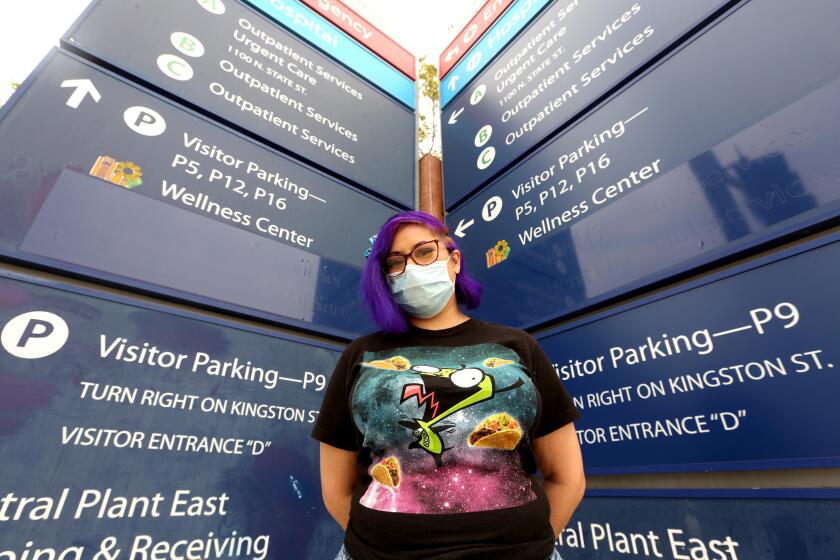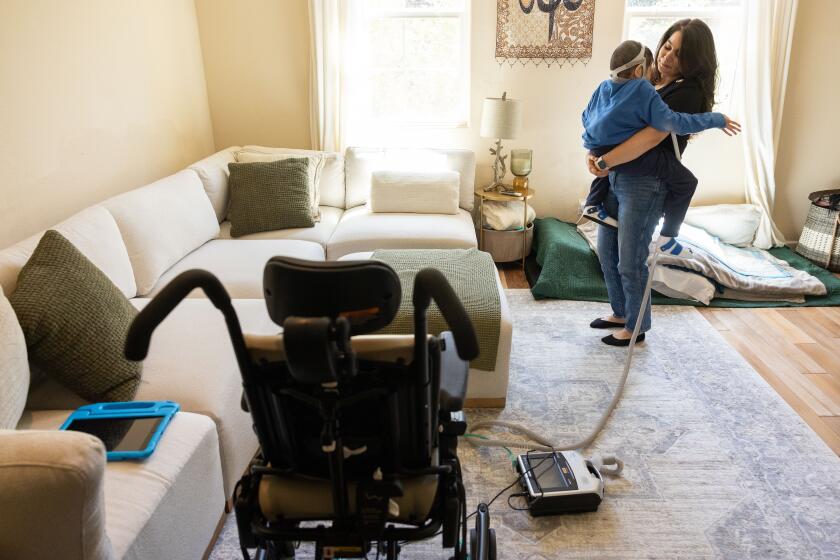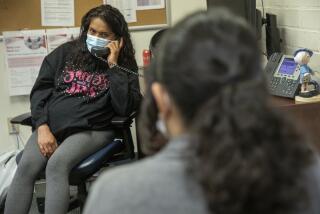Secret shoppers find long waits and scarce openings in L.A. for psychiatric care with Medicaid

- Share via
Only 15% of phone calls seeking psychiatric appointments for Medicaid patients resulted in an appointment in Los Angeles, the lowest percentage out of four cities in a “secret shopper” audit, researchers found.
Los Angeles also had the longest wait times, with the median wait stretching 64 days — more than twice as long as in New York City or Chicago and nearly six times the median wait in Phoenix, secret shoppers found.
The findings, published Wednesday in a research letter in JAMA, underscore long-standing concerns about Medicaid recipients being unable to access psychiatric care when they need it.
Earlier research has found that psychiatrists are less likely than other physicians to accept Medicaid, a public insurance program serving people with low incomes. The headaches for would-be patients are exacerbated by what critics refer to as “ghost networks,” in which health insurers list medical providers in their directories who aren’t accepting new patients, don’t take their insurance or are otherwise inaccessible to patients.
As a medical student at Weill Cornell Medical College trying to ensure follow-up for patients leaving the hospital, “one area in which I consistently was coming up against a wall was making outpatient mental health appointments,” said Dr. Diksha Brahmbhatt, who helped spearhead the audit and is now a resident physician at Brigham and Women’s Hospital in Boston.
For one young man on Medicaid, “it took about an hour and a half to try to get any appointment for him at all” — and it was scheduled about 40 days after his discharge, Brahmbhatt said.
Such experiences left her wondering, “What is the extent of this issue, especially in urban areas where we might expect access to actually be better for patients?”
A list of crisis hotlines, low-fee and sliding scale counseling, support groups, and mindfulness and meditation services
To see what Medicaid patients might encounter when seeking psychiatric care, researchers from Weill Cornell Medical College randomly chose scores of “psychiatric prescribing clinicians” — psychiatrists, nurse practitioners and physician assistants — who were listed as accepting new patients by the biggest managed care plans for Medicaid patients in each city, then phoned to ask for the soonest available appointment.
They found that less than 18% of the listed clinicians they tried to contact were reachable, accepted Medicaid and could offer an appointment for a new patient on the insurance program. Even among those psychiatric providers able to schedule an appointment, waits could stretch up to six months.
All in all, only 27.2% of offices they phoned had an appointment available for a Medicaid patient with either the intended provider or another one at the same practice. In L.A., that rate was only 15%, compared with 27.5% in Chicago, 30% in Phoenix and 36.3% in New York City. The typical waits were much longer in L.A. as well.
The JAMA letter did not speculate on why such appointments might be scarcer or waits longer in L.A. Brahmbhatt said that the study wasn’t designed to examine those differences and that the number of offices they called — 320 total — limited their ability to draw conclusions.
Health economist William L. Schpero, one of the researchers who performed the audit, said that “the access challenges we identified are likely the product of multiple factors,” including “inaccuracies in plan directories, clinician reluctance to participate in Medicaid, and an under-supply of psychiatric clinicians in some areas.”
“Which of those factors — among others — is primarily driving the relatively low appointment availability we found in L.A. requires additional research,” Schpero said.
Longtime patients have worried about moving to other sites as the Los Angeles County Department of Health Services prepares to close an outpatient psychiatric clinic at L.A. General Medical Center this summer.
Schpero and Brahmbhatt found that among the psychiatric providers with whom they could not make an appointment, 15.2% had phone numbers listed that were incorrect or out of service, and 35% didn’t answer the phone after two attempts.
This is a patient population that “already faces a lot of barriers to getting the care that they need” and may already be grappling with mental health symptoms when they seek an appointment, Brahmbhatt said.
If they hit roadblocks, they are “that much more likely to then disengage from the healthcare system.”
In California, lawmakers are weighing a bill that would mandate that health insurers keep accurate listings or face fines. The bill, AB 236, would gradually phase in requirements for increasing accuracy in provider directories, starting with at least 60% next summer and increasing to at least 95% by July 2028. Fines for faulty listings could range up to $10,000 for every 1,000 people insured by a health plan, and those penalties could be adjusted upward with time.
“When Californians can’t find a provider, it leads to delayed or more expensive care,” said Katie Van Deynze, policy and legislative advocate at the consumer advocacy group Health Access California, which sponsored the legislation. “AB 236 puts health plans on a path of improvement, so patients no longer have to call through lists of outdated providers that have moved, retired, or are not accepting new patients.”
The California Department of Managed Health Care estimated in January that implementing the bill could cost up to $12 million annually for additional staffers, but a department spokesman said it was updating its estimate based on the latest version of the bill ahead of a Monday hearing.
The January estimate was based on “additional workload to promulgate regulations and guidance, develop methodology and review plan documents for compliance” and other needed tasks to carry out requirements under the bill, department spokesperson Kevin Durawa said in an email.
Thousands of Californians have been trying to get Medicaid benefits for services to help medically vulnerable people remain at home, but the waitlist is thousands of people long, and the state is opening only 200 new slots a month.
As of June, AB 236 was backed by the National Union of Healthcare Workers and the National Multiple Sclerosis Society, among others, but opposed by industry groups including the California Assn. of Health Plans and the California Medical Assn.
Mary Ellen Grant, vice president of communications for the California Assn. of Health Plans, said its members understand the frustration that arises from inaccurate listings, but “AB 236 does nothing to address the root cause of the issue” and “simply places the full responsibility of provider directory accuracy onto health plans.”
Their accuracy is “largely reliant upon providers and medical groups maintaining their own accurate records and providing that information to health plans in a timely manner,” the group said. “The bill fails to acknowledge this shared responsibility” and is “unfairly punitive against health plans.”
More to Read
Sign up for Essential California
The most important California stories and recommendations in your inbox every morning.
You may occasionally receive promotional content from the Los Angeles Times.














